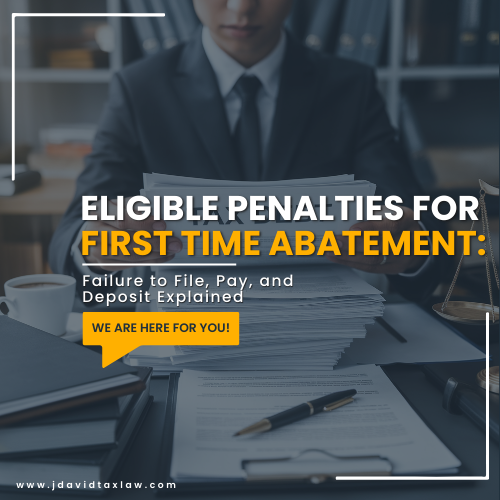If you hire a tax attorney in California, you can expect to pay anywhere from $300 to $800+ per hour or $3,000 to $40,000 for flat-rate services.
The final cost depends on factors like the complexity of your case, the attorney’s experience, and the billing method they use. Large metropolitan areas such as Los Angeles, San Diego, and San Francisco often have the highest rates due to higher living costs and competitive demand for specialized tax and legal services.
In addition to hourly and flat fees, some attorneys require retainers—upfront payments that they draw from as they work on your case. While contingency fees (paying a percentage of what you recover) are less common for tax matters, they can be an option in certain settlement-based cases.
If you’re deciding whether the cost is worth it, remember that an experienced tax attorney can help reduce penalties, negotiate better settlements, and prevent costly mistakes when dealing with the IRS or the California Franchise Tax Board.
The IRS is Forgiving Millions Each Day. You Could Be Next.
Breakdown of Typical Fee Structures
In California, tax attorneys generally stick to a few standard billing methods. Knowing which one your attorney uses and why can help you plan your budget and avoid surprises. Here’s what those structures usually look like:
| Billing Method | Estimated Cost in California | When It’s Commonly Used |
|---|---|---|
| Hourly Rates | $300 – $800+ per hour | Ongoing disputes, IRS or FTB negotiations, court representation |
| Flat Fees | $3,000 – $40,000+ | Defined services like Offers in Compromise, penalty abatements |
| Retainer Fees | $5,000 – $10,000+ | Complex, multi-step cases that require continuous work over months |
| Contingency Fees | 20% – 40% of recovered amount | Rare in tax law, but possible in certain settlement-based cases |
Hourly rates often make sense when the scope of work is unpredictable, for example, when the IRS sends an unexpected audit request or a tax dispute starts to spiral. Flat fees give you clarity from day one, which is why they’re popular for contained services like filing an Offer in Compromise.
Retainers are essentially a “standby fund” for more complex and urgent matters, which gives your attorney the freedom to work on your case without constant re-approvals. And while contingency fees aren’t common in tax law, they do appear in select settlement cases where a financial recovery is possible.
Cost Ranges by Common Tax Services
Once you know how your attorney bills, the next step is to look at what those services might actually cost. Different tax matters require different levels of time, expertise, and paperwork, which means the price can vary widely.
Installment Agreement: $3,000 – $40,000. Best for taxpayers who can’t pay their balance in full and need the IRS or California Franchise Tax Board to approve a manageable payment plan.
Offer in Compromise (OIC): $3,000 – $40,000 (often $4,000+ in California). A more involved process that aims to settle your tax debt for less than what you owe. Fees tend to be higher because of the financial analysis and negotiations required.
IRS Audit & Appeals: $3,000 – $7,500 (business cases often higher). The range depends on the complexity of the audit and whether it escalates into a formal appeal.
Penalty Abatement: $1,500 – $3,000. Often worth pursuing if late filing or payment penalties make up a large portion of your tax bill.
Tax Court Litigation: Starts at $10,000 and climbs quickly. This is the most expensive route because of court filings, preparation time, and multiple appearances.
General Tax Debt Resolution: $3,000 – $40,000. A flexible category that can cover anything from wage garnishment releases to resolving old tax liens.
Firsthand knowledge of cost averages of specific tax attorney services in California makes it easier for you to spot red flags when gathering quotes. For instance, it’s routine for Palo Alto tax lawyers to command higher quotes compared to an Isla Vista or Mendota tax attorney. We’ll get into that in detail next.
What Affects Cost in California?
Two people could hire a tax attorney in the same city and still see very different bills. That’s because what you end up paying depends on a mix of personal, legal, and market factors.
Case Complexity
A straightforward penalty abatement request is far less demanding than a multi-year IRS audit or a tax court case. The more records to review, agencies to deal with, and legal steps involved, the higher the cost.
Attorney Experience
Well-established attorneys with a strong track record in California’s tax landscape often charge more. That premium can be worth it if their expertise leads to faster resolutions or better settlement terms.
Location
Hiring a tax attorney in Irvine or Los Angeles generally costs more than in smaller California cities. Higher living costs and competitive legal markets drive up hourly rates in these areas.
Billing Structure
An hourly arrangement can make sense for unpredictable cases, but the total can climb quickly if the matter drags on. Flat fees give you predictability, but they’re usually based on the upper estimate of the work involved.
Additional Costs
Filing fees, travel expenses, expert witnesses, and document preparation aren’t always included in the base fee. Ask for a breakdown early so these extras don’t catch you off guard.
We recommend paying attention to the interaction of these factors if you want to make an informed decision on hiring a tax attorney.
Deciding if the Cost Is Worth It
Hiring a tax attorney in California is a significant expense, but the right representation can save you far more than you spend. From reducing penalties to negotiating with the IRS or California Franchise Tax Board, experienced legal help can keep problems from snowballing into bigger, costlier disputes.
If you are facing a high-stakes tax matter, investing in the right expertise can protect both your finances and your peace of mind.
Book a free consultation today with an attorney from J David Tax Law.




















